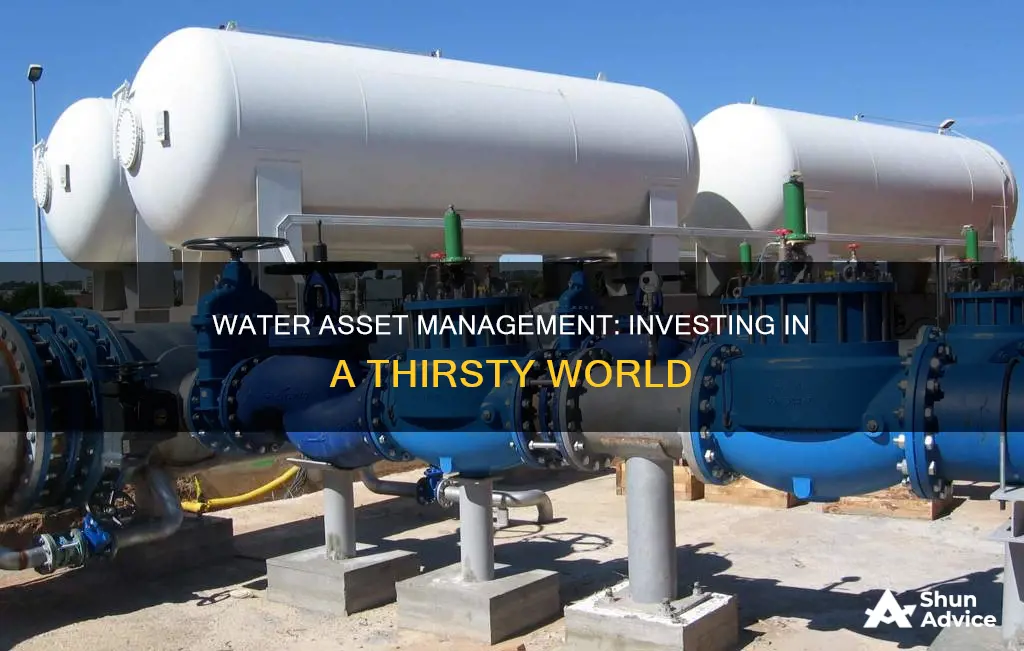
Water is essential to life, health, and the environment. It is also a commodity, and a scarce one at that. As such, water asset management is an increasingly important topic for investors. Water Asset Management (WAM), for example, is a hedge fund manager that invests in companies and assets that ensure water quality and supply. WAM's core belief is that clean water scarcity is this century's defining resource. With climate change, pollution, and increasing demand making water an ever scarcer resource, investing in water asset management is not just a financially sound decision, but also a socially responsible one.
| Characteristics | Values |
|---|---|
| Company Name | Water Asset Management (WAM) |
| Founded | 2005 |
| Based | New York, New York |
| Investment Focus | Water industry |
| Investment Strategies | Long-only global water public equity, long-short global water public equity, private equity water resources, private equity in water infrastructure |
| Investment Opportunities | Water utilities, water transportation, water treatment/purification, bottled water, water equipment |
| Investment Benefits | Diversification, inflation protection, lower volatility, positive impact |
| Notable Investments | MVIDD, Colorado River water conservation |
What You'll Learn

Water funds and ETFs
Invesco Water Resources ETF (NASDAQ:PHO)
This is the largest water ETF in the US market, with over $2 billion in assets under management. The fund invests in companies that create products and technologies for water purification, conservation, and delivery for homes, businesses, and industries. Its top holdings include Xylem Inc., Danaher Corp., and Ecolab Inc. as of October 2024. The fund has an expense ratio of 0.6% and trades on the NASDAQ exchange.
First Trust Water ETF (NYSEMKT:FIW)
The First Trust Water ETF is based on the ISE Clean Edge Water Index, focusing on companies that derive substantial revenue from the potable and wastewater industry. Its top holdings include IDEXX Laboratories, Agilent Technologies, and American Water Works. The fund has a diverse portfolio, emphasising water tech and utility companies, with a 0.53% expense ratio.
Invesco S&P Global Water Index ETF (NYSEMKT:CGW)
This ETF provides broad global exposure to the water industry by tracking the S&P Global Water Index, which includes the world's 50 largest water-related companies. Its top holdings include Advanced Drainage Systems, Geberit, and American Water Works. The fund has an international focus and an expense ratio of 0.56%.
Invesco Global Water ETF (NASDAQ:PIO)
The Invesco Global Water ETF tracks the Nasdaq OMX Global Water Index, with about 55% of its assets based in the US. The fund also has exposure to emerging markets, including China and Brazil. Its top holdings include Pentair, Danaher, and Ecolab. The ETF has a higher expense ratio of 0.75%.
Ecofin Global Water ETF (NYSEMKT:EBLU)
Ecofin's Global Water ETF is a newer entry in the water ETF space, focusing on sustainability and ESG factors. The fund invests in companies that derive at least 50% of their revenue from the water industry or are ranked highly in a water category. Its top holdings include Georg Fischer, China Lesso Group Holdings, and Core & Main. The ETF has a low expense ratio of 0.40%.
Stress Testing Your Investment Portfolio: Strategies for Success
You may want to see also

Water stocks
- American Water Works Co. Inc. (AWK): The largest listed water and wastewater utility in the US, providing services to residences, public buildings, and commercial and industrial businesses. It also has long-term military contracts.
- Consolidated Water Co. Ltd. (CWCO): A seawater desalination company that supplies drinking water to two of the three most populated areas on Grand Cayman Island. It has long-term contracts with government utilities in the Caribbean, giving it exposure to the tourism industry.
- Global Water Resources Inc. (GWRS): A pure-play water resource management company that owns and operates 29 systems providing water, wastewater, and recycled water services to utilities in communities around metropolitan Phoenix and Tucson, Arizona.
- Valmont Industries Inc. (VMI): A company that makes centre-pivot irrigation systems (sprinklers) for watering crops and technology to help farmers view their systems and make decisions more efficiently.
- Aris Water Solutions (ARIS): Aris Water Solutions has a 96 IBD SmartSelect Composite Rating and recently posted 48% EPS growth. It is ranked as the No. 1 company among its peers in the Pollution-Control industry group.
- Ecolab (ECL): A company that produces and markets cleaning and sanitation products for the hospitality, healthcare, and industrial markets. It recently acquired Barclay Water Management, a provider of water safety and digital monitoring solutions.
Water Funds
- Invesco Water Resources ETF (PHO): The largest water ETF trading in the US, with more than $2 billion in assets under management. It invests in companies that create products to conserve and purify water for homes, businesses, and industries.
- Fidelity Water Sustainability Fund (FLOWX): A mutual fund that invests in companies developing efficiencies, extending the life cycle, or identifying affordable new technologies to deliver safe, reliable, or easily accessible water.
- Global X Clean Water ETF (AQWA): An ETF that focuses on clean water and captures leaders in the space today and potential leaders of the future.
- Calvert Global Water CFWAX: A fund that consists of 126 holdings and invests only 16% of its assets in the top 10 names. It seeks to track an index composed of companies that manage water use sustainably or actively expand access to water, improve water quality, or promote efficient water use.
Investment Management: Adding Value, Growing Client Wealth
You may want to see also

Water as a commodity
Water is essential to life, health, and the environment. As the demand for clean water increases, it is becoming scarcer due to climate change, pollution, and increasing demand. Water is now being traded as a commodity on Wall Street, joining gold and oil. The Chicago Mercantile Exchange has tradeable water futures tied to water prices in California, allowing investors to bet on future water prices.
The case for investing in water is clear: it is a scarce resource with increasing demand and an unstable supply. Water funds primarily invest in water utilities companies, water transportation companies, and companies that produce equipment to treat and/or purify water.
There are multiple indexes, mutual funds, and ETFs that allow investors to gain exposure to water-related securities. The Dow Jones U.S. Water Index, the ISE Clean Edge Water Index, and the S&P Global Water Index are popular indexes tracking water-related investment opportunities.
Water stocks are stocks of companies closely tied to irrigation, utilities, water treatment, or other water-related industries. Investors can buy stocks of individual companies or invest in mutual funds or ETFs with high exposure to water stocks.
While water is a vital resource, treating it as a tradable commodity has raised concerns about human rights and sustainability. Pedro Arrojo Agudo, a UN human rights expert, warned that water trading erodes the notion of water as a common good and treats the environment as just another user. Water activist David Hall argued that privatizing water would "guarantee corporate profits to private companies," sacrificing consumers' welfare and treating water as an economic commodity instead of a basic human right.
Building a Balanced Investment Portfolio: A Comprehensive Guide
You may want to see also

Water indexes
Water is essential for everyone, and its scarcity makes it a valuable commodity. As with any other scarcity, the water shortage creates investment opportunities. There are multiple water indexes that allow investors to gain exposure to water-related securities. Here are some of the more popular water indexes:
The Dow Jones U.S. Water Index
The Dow Jones U.S. Water Index is a barometer consisting of approximately 29 stocks of international and domestic companies affiliated with the water business, with a minimum market capitalization of $150 million.
The ISE Clean Edge Water Index
The ISE Clean Edge Water Index was launched in December 2000 and contains 35 stocks. This index represents companies specializing in water distribution, water filtration, flow technology, and other water-related solutions.
The S&P 1500 Water Utilities Index
The S&P 1500 Water Utilities Index is a sub-sector of the Standard & Poor's 1500 Utilities Index and comprises just two companies: American States Water (AWR) and Aqua America (WTR).
The S&P Global Water Index
The S&P Global Water Index began in 2001 and contains 50 companies worldwide. Their water-related businesses fall into two areas: water utilities and infrastructure, and water equipment and materials.
The MSCI Global Sustainable Water Index
The MSCI Global Sustainable Water Index provides an international perspective on the water industry. It focuses on developed and emerging companies that earn at least 50% of their revenue from sustainable water products and services.
The Nasdaq OMX Global Water Index
The Nasdaq OMX Global Water Index is tracked by the Invesco Global Water Portfolio ETF (PIO). This ETF provides investors with exposure to companies involved in the global water industry.
The First Trust ISE Water Index Fund (FIW)
The First Trust ISE Water Index Fund (FIW) is another alternative for investors seeking exposure to water-related investments. It is benchmarked to the MSCI ACWI Index and focuses on improving the supply, quality, and efficiency of water resource management.
The Chicago Mercantile Exchange
The Chicago Mercantile Exchange offers tradeable water futures tied to water prices in California. These futures contracts allow investors to bet on the future value of the Nasdaq Veles California Water Index, effectively wagering on the future price of water.
Investment Strategies: University of Michigan's Portfolio Management
You may want to see also

Water infrastructure
Water is essential to life, health, and the environment. As access to clean water becomes scarcer, investing in water infrastructure is increasingly being seen as a thematic investment opportunity. Water is a key resource for many industries, including agriculture, food production, and semiconductor manufacturing. Its central role, coupled with increasing demand and unstable supply due to climate change, pollution, and rapid industrialization, makes a strong case for investing in water.
Water funds primarily invest in water utilities companies, water transportation companies, and water treatment providers. These funds come in various shapes and sizes, with some focusing on sustainability and lower ESG risks. For example, the Calvert Global Water CFWAX fund invests in companies that manage water sustainably or actively work to expand access to water, improve water quality, and promote efficient water use.
The US government has also recognized the importance of investing in water infrastructure. The Bipartisan Infrastructure Law allocates over $50 billion to improve the nation's water infrastructure, the largest investment in water by the federal government. This includes funding for the Drinking Water State Revolving Fund, Clean Water State Revolving Fund, and Water Infrastructure Improvements for the Nation Grants.
Water Asset Management (WAM), founded in 2005, is a leading global investor in companies and assets that ensure water quality and supply. WAM has a deep understanding of the industry and invests in global water public equities and private equity in Southwest US water resources and farmland. They collaborate with water stakeholders to solve water quality and supply problems, such as their active participation in Colorado River water conservation programs.
Investing in water infrastructure provides an opportunity to generate returns while delivering a positive impact. With water scarcity and increasing demand, investing in water-related assets and funds can be a strategic addition to a well-diversified portfolio.
Monthly or Annually: Which Investing Strategy Wins?
You may want to see also
Frequently asked questions
Water Asset Management (WAM) is a hedge fund manager that invests in companies and assets that ensure water quality and supply. WAM was founded in 2005 and is based in New York, NY.
Water is essential to life, health, and the environment. It is also a commodity that is becoming increasingly scarce due to climate change, pollution, and increasing demand. As a result, the price of water is likely to increase, and water investments can provide a hedge against inflation.
There are several ways to invest in water asset management, including purchasing stocks of individual companies, investing in mutual funds or exchange-traded funds (ETFs) that focus on water-related businesses, or investing in water futures or indexes.
Some popular water stocks include American Water Works (NYSE: AWK), York Water Company (NASDAQ: YORW), Essential Utilities (NYSE: WTRG), and Primo Water Corporation (NASDAQ: PRMW).
Yes, as with any investment, there are risks associated with investing in water asset management. Water stocks may be impacted by factors such as interest rates, customer growth, and weather conditions. Additionally, the water industry is highly regulated, which can affect the financial performance of water companies.







